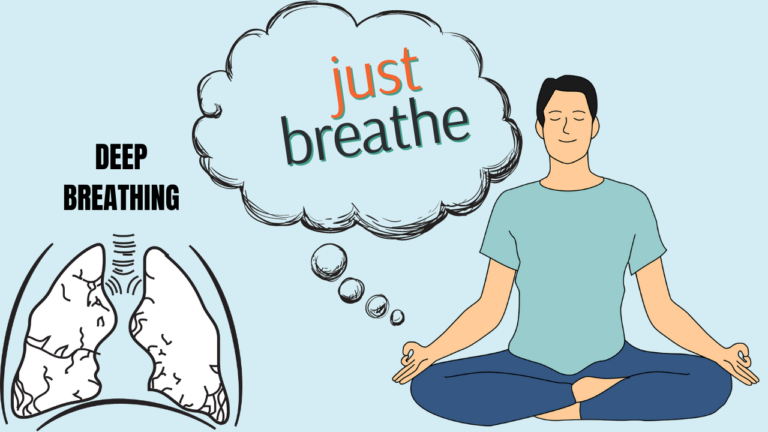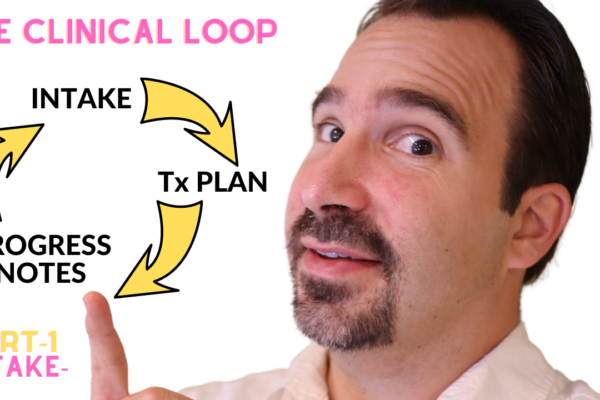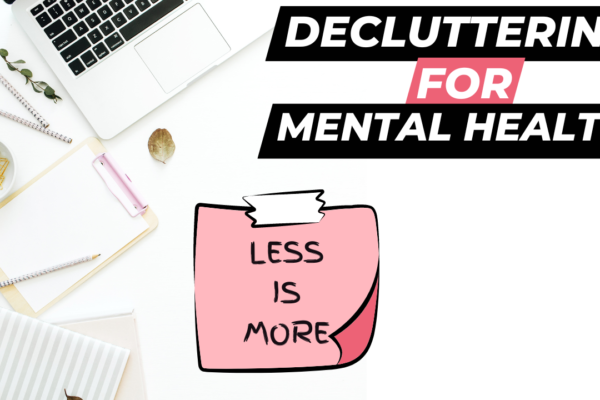Transcript
Hi everyone, Patrick Martin here and in this episode I am going to show you two methods of deep breathing for anxiety. Really, let’s go.
Welcome back to the mental health toolbox. If you’re just meeting me for the first time, my name is Patrick Morton and I’m a therapist on a mission to help raise mental health awareness by teaching others actionable information and coping skills to improve their personal development through skills I’ve learned as a therapist.
But also in my own journey of Self Improvement. Alright, so let’s go.
Just a disclaimer reminder that this episode is not medical advice or treatment plan and is intended for general education and demonstration purposes only. If needed professional, you should get one and always consult with your health care professional before practicing anything contained in these episodes. For more information on the disclaimer, you can find that in the description below.
If you’re interested in any of the books, I recommend a lot of the coping skills I discuss come from books I’ve read.
You can hop over to www.MHTGEAR.com to see a full list of my recommended books. OK, thank you so much. So today I want to talk to you about deep breathing. Deep breathing is oftentimes thought of as a part of meditation or something that requires a lot of practice.
But in reality, it isn’t one of those things where you have to be a monk. Sometimes when I think about deep breathing or meditation, I have this image in my head about being on a mountain top meditating, you know, Criss Cross Applesauce, you know, kind of thing or having to be a Yogi. But the truth is when it comes to deep breathing, it’s one of the most recommended coping skills.
Because it’s convenient and it’s easy to practice. So in this episode I’m going to teach you two ways to go about deep breathing to help reduce your stress and address your anxiety in the moment. Wherever you are OK, a coping skill should be convenient and accessible in real time, so that when you’re triggered.
You can put it into practice right away, right? Because when you’re talking about anxiety especially, it’s all about being able to intervene in the moment, whether it’s catching that anxious thought or calming down your body through biofeedback, like in this example with deep breathing so that you minimize the propensity to run away.
And avoid stressful situations, right? We’re trying to increase our threshold right for triggers and things that make us anxious and so deep. Breathing is one of those ways to deescalate in the moment so that you’re less likely to evade and then give up more territory in life to something that you don’t have to Alright. And This is why deep breathing is one of my favorite coping skills, and one of the most popular coping skills you hear about.
In the realm of mental health is because it is one of those things you can just pull out of your pocket and put into practice. It’s not something that requires a whole lot of friction in terms of access. All right. First, I’d like to talk to you about why deep breathing works. OK, the acute stress response is responsible for.
The increased heart rate and the shallow breathing that we often associate with anxiety as your fight or flight response that’s being activated via the sympathetic nervous system. And so when we put deep breathing into practice rather than being the gas like the sympathetic nervous system, the stress response.
We’re actually engaging in the rest and digest response for the body that activates the parasympathetic nervous system and so deep breathing is a quick way to access that rest and digest response and send a message back to our brain that we’re safe and secure. We’re not in danger. There’s no Tiger chasing us all right?
The (American Institute of Stress). puts it this way. Deep breathing increases the supply of oxygen to your brain and stimulates the parasympathetic nervous system, which promotes a state of calmness.
Breathing techniques help you feel connected to your body. It brings your awareness away from the worries in your head and quiets the mind.
There’s another article why deep breathing helps calm anxiety by Psych Central, which explains how deep breathing actually turns off. The bodies stress response, and I’ll be sure to include that in the description. Alright, so we talked about why it works now. I’d like to share with you how it works, so when it comes to deep breathing for anxiety, there’s really 2 main types.
In this article, Why Deep Breathing Helps Calm Anxiety, PsychCentral explains how deep breathing actually turns off the body’s stress response.
Methods I would like to share with you, the first of which is 4 by 4 breathing and the second of which is 4 by 8 breathing. So with a four by four breathing, sometimes referred to as box breathing.
We will count 4 seconds in through the nose and four seconds out through the mouth and a nice thing about four by four is we can use imagery for this. It’s used by the military, oftentimes, also because it’s easy to remember, easy to implement, all right? So imagine a square or box right and each line.
Represents 4 seconds so.
If I’m counting.
4 seconds in through my nose 1234 and then out through my mouth 1234 and then in again 1234 and out again 1234 right and it would look something like this.
See simple enough and you can do this. I would usually encourage at least a minute of deep breathing, as usually when it’s effective.
But you do as much or little as you need to, so that’s box breathing again in through the nose and out through the mouth. Now, what sets this apart from 4 by 8 breathing is that it’s often times less concentrated, right 4 by 8 breathing is sometimes referred to as Perst breathing because we’re actually pursing our lips.
A little bit to restrict the airflow right? And this helps to work the lungs a little bit harder. OK, with four by eight breathing two, we’re focusing a lot more on the abdomen, right? With the deep breathing you’ve heard of breathing through your stomach and not your chest. Sometimes that’s exactly what we’re talking about.
So you’ll actually feel your stomach expand and should be doing most of the work for you in your diaphragm. Now, with a four by eight breathing.
We are generally aiming for six breaths a minute, OK, but certainly depends. Like with any exercise, you want to tailor this to your your needs or your limitations, and you can always work your way up to that if you know if it’s feasible for you. But just a note of caution, you know, as with any skill.
You know, definitely do that. If you start to feel lightheaded or if it’s sending a signal to your body that this hey, this doesn’t feel safe, then don’t do it. You know you can just modify it as needed, but definitely always talk to your doctor when practicing these things. If you have any issues, OK, alright, so with four by eight breathing.
We’re going to breathe in through the nose for a SEC through our diaphragm and then out eight seconds through our mouth, but this time remember we’re person our lips, so it looks something like this.
Much slower, right? And again, we’re focusing on the abdomen. You know to do most of the work for us all, right? And so that’s much slower breathing. And sometimes the four by four breathing is a little more reasonable if you don’t have a whole lot of time to focus that heart on your breathing.
Um, and it requires you know less to think about. But when it comes to if you have a little more time, a little more wiggle room such as you know if you’re doing a kind of guided meditation, mindfulness, just some quiet time at home practice the deep breathing I I recommend the four by eight if you have the time. OK, so hopefully you found this helpful.
If you did, be sure to like and subscribe. If you have any questions, anything you would like me to talk about on this channel regarding mental health self improvement, just leave me a comment an I’d be happy to add that to my content calendar and dive into it with you. OK, so as always keep using these tools to improve your quality of life. Keep thriving.
And make good things happen. Alright, you take care!
ASK: If you have a question you’d like me to answer here on the blog (even if you think it’s a silly one!), please use the form on the CONTACT ME page, or the comment section below. I would be happy to take a poke at it and provide a long form answer when appropriate.
SHARE: Also, be sure to share it with a friend, as there is still a lot of work to be done in raising mental health awareness.
SUBSCRIBE to get your FREE MOOD TRACKING TOOL and quick Mental Health Hacks in addition to this newsletter. Sign-up with the form below.
NEED CRISIS HELP? If you need immediate crisis help with your depression, you can call the National Suicide Prevention Lifeline at 1-800-273-8255 or text “START” to 741-741
OUTSIDE THE UNITED STATES: See International Suicide Hotlines
WHERE TO FIND MENTAL HEALTH HELP:
-NAMI Referral Helpline: 1-800-950-6264
-California’s Statewide Mental Health Helpline: 1-855-845-7415
The Mental Health Toolbox: Resources and Support for Therapists Seeking Growth & Impact.
Mission Statement: To equip therapists with the tools, knowledge, and strategies they need to enhance their practice, boost their income, and ultimately, improve the lives of their clients. We achieve this through accessible, high-quality content, practical resources, and a supportive community.
admin
Latest posts by admin (see all)
- How to Build a Referral Engine Without the “Hustle”: - January 12, 2026
- ADHD Tips for Therapists | with Dr. Jennifer Dall - May 28, 2025
- Why Therapy Fails Men (And How to Fix It) – Insights with Marc Azoulay - May 11, 2025










